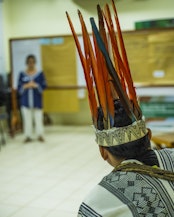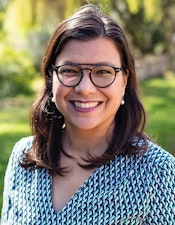Indigenous Governance in the Peruvian Amazon

Indigenous Governance in the Peruvian Amazon
- Our Objective
This project explores Indigenous Territorial Governance Schemes (ITGS) in Madre de Dios, analyzing their effectiveness in promoting environmental justice, community well-being, and nature conservation. In close collaboration with the Native Federation of the Madre de Dios River and its Tributaries (FENAMAD), the research aims to identify governance structures that can serve as replicable frameworks for Indigenous and local governance in similar tropical forest regions worldwide.
- Figures
The project was launched on January 1, 2023 and is currently in progress.
Summary
This project focuses on exploring and strengthening Indigenous Territorial Governance Schemes (ITGS) in Madre de Dios, Peru. It aims to map and define diverse governance models across Indigenous territories, examining how different knowledge systems—Indigenous, academic, technical, and state—are integrated or excluded in decision-making processes.
By evaluating the impact of ITGS on environmental justice, community well-being, and long-term sustainability, the project seeks to better understand how these systems contribute to the protection of both people and nature in tropical forest regions.
The project is carried out in collaboration with the Centre for Development and Environment (CDE) at the University of Bern and FENAMAD, which supports the design and implementation of activities, including the Indigenous Researchers Program, a key step in strengthening Indigenous leadership and regional representation in governance dialogues.
Project Connections
- Part of the solutionscape
Maintaining multifunctional landscapes in a tropical forest frontier
Timeline
Collaborative approach with Indigenous Communities
Project Update June 1, 2025
In the Peruvian Amazon, Indigenous communities face unique challenges in asserting their territorial rights despite established rights to self-determination (UN Declaration on the Rights of Indigenous Peoples, 2007) and the vital knowledge they possess for managing their lands. Through a mixed-methods approach, the project involves Indigenous communities as equal partners in the research process, ensuring that Indigenous knowledge is recognized and valued. This collaborative approach includes interviews, policy analysis, and participatory methods, with a focus on systems thinking to identify leverage points for sustainable governance. The project also examines the challenges and opportunities for scaling these governance models to other tropical forest regions, creating adaptable frameworks for just and sustainable governance practices. Ultimately, the project aims to provide valuable insights and policy recommendations for enhancing Indigenous governance, promoting environmental justice, and safeguarding biodiversity. It hopes to influence global policy by demonstrating the effectiveness of Indigenous-led governance in achieving social and environmental goals. By fostering inclusive research methods and creating scalable governance models, the project looks to support the long-term sustainability of Indigenous territories and the ecosystems they protect.
Key Milestones
Project Update January 10, 2025
Engagement and codesign (2023-2024): Initial engagement and codesign with Indigenous organizationsMapping and characterization of ITGS (2023-2024): Mapping of Indigenous actors and governance schemes.Scientific knowledge dialogues (2024): Promotion of dialogues between academic and Indigenous knowledge through international conference sessions.Implementation of Indigenous Researcher Program (2024-2025): Training and inclusion of Indigenous researchers in the project.Knowledge integration analysis (2024-2025): In-depth interviews to evaluate the role of diverse knowledge systems.Environmental justice and well-being assessment (2025): participatory data collection to evaluate impacts on communities and nature.Leverage points analysis (2025): Multistakeholder workshops to validate findings on challenges and opportunities and identify leverage points.Global environmental assessment (2025): Inclusion of Indigenous knowledge in UNEP’s Global Environmental Outlook 7 (GEO-7) through an international taskforce
Other Projects in this Solutionscape
From knowledge to action: Information for conservation in Tambopata
From knowledge to action: Information for conservation in TambopataTambopataLab: Incubating solutions for conservation
TambopataLab: Incubating solutions for conservation







